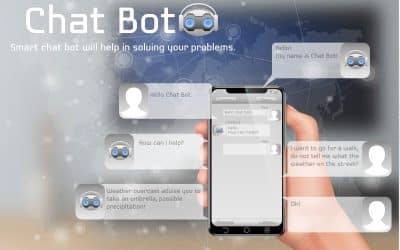Artificial Intelligence is making massive transformations across various sectors, including the medical field, which is not an exception. AI software solutions could transform how we look at healthcare, starting with improving diagnosis and treatments and medical research and analysis. Through AI, medical professionals can deliver patients more efficient and accurate healthcare. This will make the healthcare system more affordable and accessible.
The use of AI Healthcare Software Development is spreading since healthcare professionals have begun to realize the advantages of technology. However, healthcare organizations are just some of those benefiting from AI solutions. They also help their patients. When using AI technology in their processes, companies can take advantage of opportunities to improve effectiveness while patients enjoy better healthcare quality. Aren’t you amazed?
Even though you are aware of the power of AI, the most critical concern is how companies can use this power to incorporate AI into their business processes. This article focuses on incorporating AI in healthcare software, its potential benefits, and some striking usage examples.
Ways Generative AI Will Transform Healthcare
Generative AI has introduced significant disruption in healthcare with far-reaching implications across medicine, diagnostics, and beyond. Could AI technology tackle some of the critical issues facing our stretched healthcare system and improve everyone’s access to healthcare? If these examples indicate, generative AI can undoubtedly bring considerable value to the healthcare sector. Below are some ways that generative AI could improve healthcare quality.
Personalized On-Demand Health Advice
Highly sophisticated intelligent AI models, such as GPT-4 and GPT-4, in conjunction with doctors’ expertise, have resulted in a new generation of virtual healthcare assistants. Doctors have developed Ada as an AI-driven program designed to analyze patients’ symptoms and assist in various languages (including English, German, French, Spanish, Portuguese, and Swahili). The app has 13 million registered users and has over 30 million symptoms assessed. The app works by asking questions regarding the symptoms you experience (you may also make separate profiles on your symptoms to share with relatives) and directing at possible medical conditions and advice. It also monitors your symptoms over time as they develop.
Millions of people worldwide cannot obtain medical services (either due to their geographical place of residence, economic issues, or the fact that their local healthcare services are over-stressed). We anticipate having the generative AI take up a portion of the burden.
Increase Early Detection Of Diseases And Make Better Predictions
We all know the importance of prevention over cure. But until now, this has yet to be attainable apart from advocating certain modifications to your lifestyle. However, now it is driven by data. Apple Watch1, for example, has been taking measurements regularly and can use the data to determine heart-related irregularities, which could aid in the earlier detection of heart attacks. My colleague has been working with sweat sensors. They can provide you with information on diabetics or other illnesses simply through the sweat you produce. There are many different devices available that are affordable and widely accessible.
They also have low power and can use AI to identify abnormalities and offer recommendations. You can also contact help in the event of any adverse reaction. AI helps in detecting cancer early and with minimally invasive methods. For example, AI is making body scans of the entire body much more efficient and assisting in reconstructing high-resolution images without the need for many hours of computer. Big data can also play an important role. It is possible to look at data in a larger demographic context and identify patterns that can assist us in determining what symptoms of heart disease might be.
AI As a Diagnostics Copilot
In healthcare, we’ve seen the enlightening use of AI as Copilot. It helps healthcare professionals to perform their tasks more effectively and accurately. An exciting instance of this is diagnostics.
Diagnostics in medicine use symptoms, medical history, and test results (such as imaging tests, blood tests, or biopsy techniques) to pinpoint precisely where health problems stem from and establish accurate diagnoses for treatment by healthcare providers. Diagnostic testing also helps healthcare practitioners decide upon appropriate Healthcare AI Software Solutions. AI algorithms can revolutionize medical diagnosis by evaluating medical images (X-rays and ultrasounds, MRI scans and CT scans) and vast amounts of patient information (vital signs, demographics, and medical histories) to detect and treat illnesses more accurately than ever.
Utilizing AI diagnostic technologies can yield significant benefits for the health industry, including validating doctors’ diagnoses and assisting in decision-making. Also, improving the accuracy of diagnosis allows early detection of illnesses and facilitates the accessibility of healthcare. Today’s hospitals carry out 3.6 billion procedures for imaging each year and generate a vast amount of data, but about 97% of that information is not used. When machine learning models are trained with this data, healthcare organizations can be more precise and efficient in diagnosing patients and get patients on a faster, better, more efficient treatment path.
Enhancing Accuracy And Efficiency Through Artificial Intelligence For Medical Imaging
Using the latest algorithms and machine learning capabilities, AI technology can analyze vast quantities of medical imaging with fantastic quality. This enhances the efficiency and accuracy of identifying minor irregularities that might have gone unnoticed by traditional approaches. AI-powered medical imaging speeds up diagnostics by automating image analysis, resulting in quicker treatment times. Furthermore, AI enables collaboration between medical professionals by remotely accessing medical imaging, eliminating geographical obstacles. Ultimately, using AI for medical imaging holds enormous potential to change healthcare settings’ treatment and diagnosis processes worldwide.
Facilitating Administrative Tasks Through Artificial Intelligence Technology
Regarding administrative tasks, AI technology automates repetitive and lengthy processes such as scheduling appointments and handling electronic health medical records. It allows health professionals to concentrate on the patient’s care. AI systems can process vast volumes of data in a short time, which can optimize resource allocation and forecast patterns of flow in hospitals.
In addition, AI-powered chatbots with natural language processing capabilities can provide immediate responses to patient queries, allowing personnel to focus on more complicated jobs. Implementing AI to manage administrative tasks can boost effectiveness and efficiency within healthcare facilities, allowing doctors to spend more time providing high-quality care.
Billing Management & Categorization
There are a few aspects better than the billing classification and management process in the pursuit of cost reduction. In spinal surgery and many other orthopedic procedures, A sales rep is located in the operating area to supply the necessary materials, instruments, drugs, and tools that the hospital does not have in stock but are required to perform the surgery. The hospital is then invoiced for any items used within the operating room.
AI plays a crucial part in validating the products used in surgery and ensuring that the products the representative said they used were employed. AI-Driven Healthcare Solutions can also be utilized to study historical data for any irregularities in real time. AI could play an additional part in ensuring the availability of surgery tools and products, using predictive analytics to predict precisely what supplies will be required. The AI tool reduces the risk and expenses for patients and hospitals, shielding their assets from theft and ensuring accurate billing and efficiency.
Tailored Treatment And Health Plans
Generative AI can also aid physicians in providing superior patient care by analyzing vast quantities of patient data to develop tailored treatment strategies, optimize medication dosages, and predict any likely adverse reactions related to each patient. In addition, it may help in creating customized rehabilitation and therapeutic programs. Furthermore, Generative AI could help in enhancing preventative medicine. In particular, clinics and hospitals can use generative AI to design personalized health plans based on the person’s genetic profile, health history, and lifestyle.
Accelerating Drug Development
Generative AI has already impacted the development of drugs that treat ailments. How? It can assist researchers in understanding the markers of disease much more efficiently and discover the best combinations of chemicals to develop new pharmaceutical therapies. This is why AI could accelerate the process of the development of drugs by creating new molecular structures, rapidly screening compounds, forecasting drug interactions, and repurposing medicines for new applications. As well as optimizing clinical trials and improving drug formulations. As time goes on, it could also be used to improve personalized treatments – as the drugs can, theoretically, be customized based on the individual data of patients.
Electronic Health Records (EHRs)
AI technology is now becoming more crucial for EHR administration. AI will allow medical personnel to look over vast quantities of medical information to find patterns and trends that could help in the prevention of illness as well as treatment. AI algorithms can examine EHR records to discover patterns and patterns. It can aid physicians in identifying patients susceptible to developing particular diseases and implementing individualized preventive strategies. AI can also analyze pharmaceutical information to identify the patterns that can cause adverse drug reactions and offer alternative treatment options.
Artificial intelligence can help identify billing fraud and improve medical code accuracy for greater patient efficiency, decreasing costs, and better results. It can lead to reduced costs and better results for patients. For example, artificial intelligence (AI) can review billing records and identify patterns that indicate fraudulent claims, such as duplicate billing or the charging of services not offered. AI-powered chatbots and virtual assistants provide remote care for patients and assist patients in their medical diagnosis. This could free up some time for doctors and allow them to concentrate on more complicated issues.
Medical Research
Artificial Intelligence (AI) is revolutionizing medicine through its assistance in medical research. For example, AI algorithms can study massive medical records and genetic information databases to find connections between genetic and environmental variables. It could result in new treatment options or diagnostic devices for various illnesses.
AI for medical research includes identifying potential drug candidates and conducting clinical studies. Scientists working on AI-related research can use tools for modeling for more than just generating theories; they can also try them out in simulations. This will result in more precise predictions before testing on human beings, thus reducing expenses and increasing the speed of the development of pharmaceuticals.
However, the use of AI for medical research is a subject with legal and ethical issues, including the security of patient data utilized for research that must be secured. There are also concerns about bias due to the lack of coverage of different populations in the data sets studied by machines. If this issue remains unresolved, this could result in discriminatory policies and services created from these datasets, adversely affecting subgroups of the population excluded from modeling.
Guide To Integrating AI Into Healthcare Software Solutions
Take a peek at the steps to incorporate AI in healthcare software.
Define Your Organization’s Needs
If you have decided to pursue AI solutions as part of an integration strategy, the first step should be defining your integration objectives. What goals would you like AI options to help achieve, what processes might need streamlining or improving efficiency, and what are its potential benefits for your company? Plus, how much could be set aside as funding? By answering these questions, you ensure that the concept is genuine, resulting in you ending up with a list of the requirements for AI solutions and the team implementing the solutions.
Select A Reliable Tech Partner
Knowledge and experience are essential when looking for the right partner to implement AI technologies into the daily operations of a medical firm. Service providers for hardware and software should be aware of the laws, standards, and issues facing the healthcare sector. Feel free to interview potential suppliers’ technical specialists and reach out to previous clients of each potential supplier to gain more information regarding their experiences and approaches to work.
Choose A Suitable AI Solution
There are numerous accessible AI techniques and software. This decision is influenced based on the type of information you plan to process, the availability of it, the technical requirements of your AI technology, its regulation compliance, and the cost. Suppose you intend to create an artificial intelligence system entirely from scratch or combine an already-built solution with only minor changes. In that case, we suggest consulting with an expert AI integration partner.
Plan For The Execution
The quality and quantity of the data used in the training of AI algorithms are directly related to the effectiveness of the AI project. Thus, gathering and analyzing the data is essential to prepare for integration.
It could be medical images, medical transcription EHRs, information from wearable devices, and more, based on the issue that the algorithm can handle. It is essential to check that the AI option chosen meets the regulations and standards of regulatory agencies like HIPAA and the GDPR.
Train, Test, And Deploy The AI Solution
After the data has been compiled, you can begin training the AI system and assess whether the results are accurate. Engineers are the primary contributors to this procedure; you should include experts from healthcare who will use this solution shortly. They will be the ones who verify the accuracy of the algorithm. Once the AI model is validated, it is possible to implement it. Then, the in-house team can integrate it into your organization’s process.
Monitor And Adjust Your AI Solution Accordingly
The effort continues after implementing the solution. Artificial Intelligence programs, especially in healthcare, must be continuously monitored and improved. This method involves receiving feedback from the users (in this instance, primarily physicians as well as patients), analyzing the impact of AI technology on the performance of healthcare organizations, and then changing the AI to get the expected outcomes.
Ethical Considerations In AI Use In The Medical Industry
The application of AI for healthcare is increasing, and it is a subject of ethical issues that must be dealt with to ensure the possible benefits are realized. The four major ethical concerns are informed consent, transparency, safety, algorithmic fairness, and data privacy. Properly addressing these concerns ensures patients feel confident about using AI in medical care.
Beyond the issues particular to the medical field, AI also raises broader ethical issues for society, like privacy and monitoring, discrimination and bias, and the significance of human judgment. It is essential for AI developers and those using AI technology to cooperate to develop solutions that respect humanity’s diversity, autonomy, and freedom, and this is while developing equitable systems to address any possibility of biases.
Ethics-based principles regarding health care for patients should guide the development and design of AI technology platforms. They include the principles of non-malice (the concept of not harming) and beneficence (the concept of doing good), Respect for the patient’s autonomy (allowing patients to decide for themselves), and justice (ensuring equality in access to healthcare). Collaboration with experts from various areas, such as ethical experts and social scientists, is crucial to ensure that these values are adhered to during development.
There is much promise in using AI technology in healthcare. Still, it must be done with precise attention to ethical issues so everyone benefits from this advancement towards better healthcare outcomes. Covering ethical concerns like data security and privacy ensures the public’s confidence while preserving moral standards set by society. This shows accountability by establishing effective regulatory frameworks in diverse countries worldwide. A dialogue about ethics between the innovators working in artificial intelligence can assist in developing new concepts that will improve healthcare outcomes. Also, the appropriate scope of refined systems that work with health professionals should be created.
Future Possibilities For Artificial Intelligence In Healthcare
AI has already taken remarkable strides to revolutionize the medical industry. Many exciting advances and new developments are on the horizon, holding massive promise for the coming years. One field in which AI will likely significantly impact is personalizing healthcare. Another exciting development is incorporating AI with wearable devices and sensors to enable early recognition of health issues or changes to a person’s health.
In addition, AI holds great potential for drug development and discovery by analyzing massive data sets drawn from different sources, such as the scientific literature or clinical trial outcomes. Furthermore, advances in natural technology for processing of language (NLP) capabilities could improve communication between doctors and patients while decreasing the administrative burden for health specialists. These advances can enhance patient healthcare and transform the medical landscape with better worldwide diagnoses, treatment options, and health outcomes.
Conclusion
Artificial intelligence (AI) is changing how healthcare is conducted in terms of accuracy and effectiveness in medical imaging. Utilizing machine learning and predictive analytics, personalized medical care becomes possible. AI algorithms continually process vast amounts of data to create exact diagnoses and formulate precise treatment strategies. With the help of AI Healthcare Services, healthcare professionals can concentrate on treating patients. Yet, problems like data security or interoperability must be tackled to ensure widespread acceptance. Ultimately, AI can transform treatment, diagnosis, and patient outcomes globally while considering ethical considerations.











